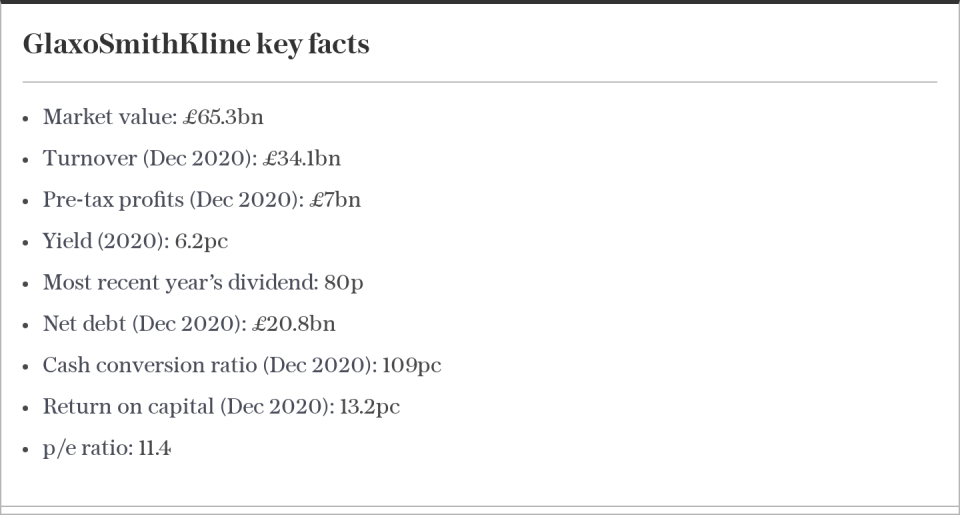Questor: we’ve made an 11pc loss on GlaxoSmithKline. Here’s why we’re sticking with it


One of the most difficult aspects of investing is deciding what to do with loss-making positions. No investor is immune from them, since it is impossible to have a 100pc record. However, there is no hard-and-fast rule as to when savers should stick with their portfolio’s poor performers.
In Questor’s view, the decision is best approached on a case-by-case basis. A stock that has fallen in price but whose investment rationale remains intact is worth holding. There may even be an argument for adding to the position at a lower price.
This takes us to today’s stock: GlaxoSmithKline. The FTSE 100 healthcare business was tipped by this column in January 2019 but its shares have fallen by 10.6pc since then. However, many of the reasons for our original recommendation still apply.
Watch: European stocks fell from all-time highs; Dow, S&P 500 snap 3-session win streak
Notably, the firm is on track to separate into two entities next year. One part will be a consumer healthcare business that offers strong yet stable growth prospects. Its potential was highlighted by the 14pc rise in revenue posted by GSK’s consumer arm in the 2020 financial year.
The other business after separation will be a drugs maker. GSK’s performance in this sphere has disappointed for many years. However, a sharper focus after the demerger should allow it to develop a greater number of blockbuster treatments. Indeed, it plans to launch more than 20 new products by 2026. More than half of them are expected to have potential peak revenues of more than $1bn (£730m) a year.
The separation programme remains on track to deliver its targeted £700m annual cost savings by 2022 and £800m by 2023. The firm expects to reinvest a portion of these savings to improve its competitive position. Meanwhile, the company is making progress in reducing its borrowings.
It was able to cut net debt by 18pc in the 2020 financial year, partly as a result of asset disposals. The result was that net interest costs were covered more than nine times by annual operating profits, as opposed to six times at the time of our original tip.
Sign up to our Business Briefing newsletter for a snapshot of the day’s biggest business stories
Read Questor’s rules of investment before you follow our tips
Thanks to the stock’s unpopularity among investors and a modest rise in earnings, its valuation has fallen: it now trades on a price-to-earnings ratio of 11.4, against 12.8 when we made our original recommendation. Given that its financial prospects and strategy remain largely intact, this suggests that the shares now offer significantly better value for money.
In the long run, growth catalysts such as an ageing global population and increasing urbanisation – and hence wealth – remain in place. For example, the proportion of people aged 65 and above is forecast to double by 2050. Meanwhile, 68pc of the world’s population is expected to live in urban areas by 2050, up from 55pc in 2018.
These factors could lead to a rise in demand for GSK’s products, particularly in its oncology and vaccine segments. Its 12pc increase in research and development expenditure in 2020 should further enhance its long-term growth prospects.

Many of the risks to face the business have been present for some time. For instance, a probable decline in dividends after 2022 was flagged in our original tip. Since then, the decline in the share price and a forecast dividend yield of 6.2pc suggest that investors have adequately factored in any fall in distributions to shareholders.
Similarly, the risks involved in conducting the corporate split have not changed materially since its announcement more than two years ago. In fact, the firm’s resilient financial performance amid the disruption caused by coronavirus restrictions suggests it could offer relatively defensive characteristics despite an uncertain near-term outlook for the global economy.
Of course, GSK has lagged rival pharmaceutical firms in the race for a Covid-19 vaccine. However, its continued progress in moving towards separation and the growth opportunities this could provide mean we remain optimistic about its prospects.
At a lower price than at the time of our original recommendation, it appears to offer an even more attractive risk/reward opportunity.
Questor says: buy
Ticker: GSK
Share price at close: £12.98

Read the latest Questor column on telegraph.co.uk every Sunday, Tuesday, Wednesday, Thursday and Friday from 5am.

 Yahoo Finance
Yahoo Finance 